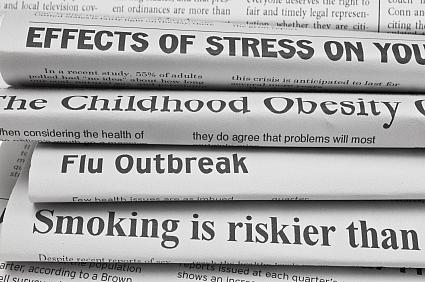Random Recap of Health Journalism 2012 (AHCJ)

As a writer new to health reporting - and I mean Reporting with a J-school capital 'R' - I learned a lot at Health Journalism 2012, the annual conference of the Association of Health Care Journalists. Here are my impressions and random takeaways from the conference.
1. Befriend a biostatistician. From the Evaluating medical evidence for journalists session by Gary Schwitzer of Health News Review and Ivan Oransky of Reuters Health. You know all that numbers crap you see in drug advertisements and medical studies? It matters. It matters a lot. Learn the difference between absolute and relative risk/benefit data. And if you're "really bad at math," don't despair. Use a calculator and the tookit at Health News Review.
2. New Mexico currently ranks #1 in a Google search on the term "allergies." I know this because: a) the nice lady presenting Google tools for health reporters showed us a slide that bore out this fact, and b) because I live in Albuquerque and am eating Zyrtec like candy these days. (Do not try this at home.) You can discover similar trend info by using Google Insights for Search. She also told us about Google+ for Media. Who knew?
3. There will be free, open sessions at the Alzheimer's Research Summit May 14-15, 2012. This, via Dr. Buckholtz at the session Is earlier diagnosis of Alzheimer's around the corner? (Maybe/maybe not, by the way.) Anyone can attend the public sessions, but you have to register in advance. So if you live in the Bethesda, Maryland, area: GO. Whether, like me, you cover the Alzheimer's beat or you're a concerned citizen, get the info and give your input. This stuff's important.
4. It's OK to stalk editors via Twitter. At least, it's OK to stalk some of them. So says Brendan Maher, features editor of Nature, who participated in the Freelance: Pitches that are a hit with editors session. Other tips from various participating editors: Read the magazine you're pitching before you pitch it. (I say: If you don't already know that, take a Freelancing 101 course, please.) Also, flattery works but obsequiousness may cross the line. And if you do get a bite from an editor, don't be afraid to ask about money. If the editor requires you to read and cite "10-15 research studies" for a short, one-pager FOB piece, $2/word maybe ain't all that much. [Edited to clarify: Brendan was one among several editors fielding freelancer questions that day. An audience member (not yours truly) seemed to have an issue with the $2/word pay rate offered by a different publication and spoke up rather forcefully about it.]
5. Jimmy Carter is still a darn fine gentleman. He's witty, candid, and down-to-earth. Oh, and did I mention smart? And savvy? But you'd expect that from a former president. His lovely wife, Rosalynn, remains as gracious as you'd imagine and continues to champion a cause that's dear to my own heart: parity in mental health treatment. Their efforts via the Carter Center have nearly wiped Guinea worm off the face of the earth, and they're pushing to get the Mental Health Parity Act, which was passed by Congress two years ago, implemented. What's the holdup?
But the biggest takeaway for health reporters at Health Journalism 2012 was this: membership in AHCJ is worth every penny. Among the many benefits: resources, tools, fellowships, an affordable annual conference, and a great bunch of helpful fellow members who share freely on the listserv. I'm so glad I joined. And I can't wait for #AHCJ13.
Originally posted at my Medical Matters blog.
